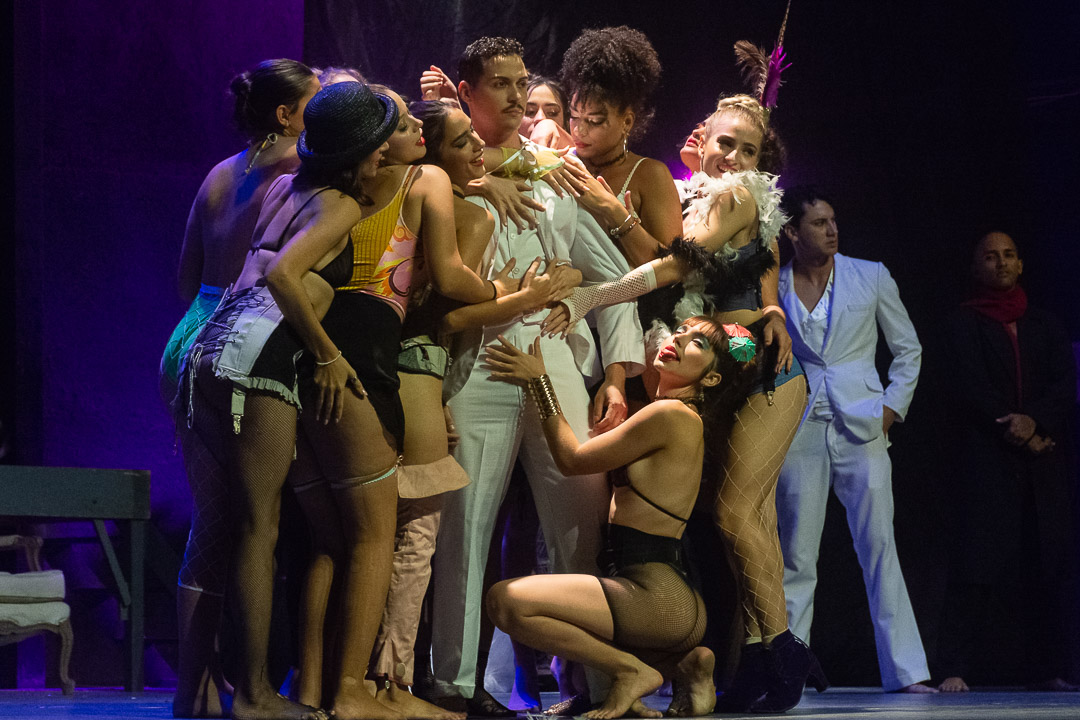Carlos Díaz, true to his reputation as an unrelenting provocateur, arrived at the Camagüey National Theatre Festival with Réquiem por Yarini, a work overflowing with audacity and visual opulence. His always-controversial style once again challenges conventions and shakes the audience, this time with a stark reflection on power, morality, and desire.
The show by Teatro El Público, lasting over two hours of intensity and total art, was the perfect spark to ignite the Encuentro con la Crítica. This space, dedicated to revealing the creative processes behind the scenes, poses a central question: How does Carlos Díaz transform scandal and controversy into such a profound and powerful theater?
The theoretical event began on Tuesday, coordinated by the Criticism and Research Section of the Association of Scenic Artists of the Union of Writers and Artists of Cuba (Uneac). It took place at the Santa Cecilia Convention Center, with Omar Valiño as moderator, and featured the participation of Norge Espinosa, playwright and advisor to Teatro El Público, who discussed the process and connotations of the performance, presented here at the Avellaneda Theatre.
Norge Espinosa opened the dialogue by emphasizing the need to "recover the vibrations" in present-day Cuba and to reflect on "what we do as theater". The great question of our time is intrinsically linked to the "destiny of Cuba". He shared insights from the rehearsals, which began in March and culminated in the June premiere of the show, emphasizing the importance of playwright Carlos Felipe, the author of the foundational work.
Carlos Felipe, situated in a "transitional dramaturgy" between the 1940s and 1950s, wrote the play that inspired this performance, which premiered in 1965 under the direction of Gilda Hernández with the National Dramatic Ensemble.
According to Espinosa, Réquiem por Yarini imagines Cuba as a brothel on San Isidro street, a place where the life or death of a man is decided. This interpretation, directed by Carlos Díaz, pays homage to the original text through an act of "invocation of greater forces". He noted that while the performance couldn't be presented in Camagüey with the Trianón catwalk, which dialogues with the life of Havana's Línea street, it remained true to the spirit of Teatro El Público’s productions.
The critic also highlighted the challenge of addressing works from tradition, pointing to the influence of masters like Roberto Blanco and Berta Martínez, always present in Díaz's creations, as well as nods to other productions by the group. Espinosa also praised the contribution of Armando Correa's research, which focused on Carlos Felipe and his portrayal of marginal characters and popular scenes in Cuba’s history.
Espinosa reflected on the spiritual dimension of Réquiem por Yarini, describing it as a "dialogue with the beyond, with forces, with saints", an expression of faith that serves as refuge in the face of adversity. The work, featuring a cast of about 35 actors, demands great sacrifice and dedication, but the audience has responded with enthusiasm and gratitude, creating a deeply rewarding experience for the team.
In this context, Kike Quiñones, Dean of the Faculty of Theatre Arts at the University of the Arts (ISA), acknowledged that Réquiem por Yarini provided the university with a renewed perspective on the formative process. For this performance, Carlos Díaz, National Theatre Award winner, involved 18 students, integrating them actively into the creative process.
"Teatro El Público, as a solid reference in the Cuban scene, has given the faculty the opportunity to design creative dynamics that directly connect students with professional theater groups, while still remaining aligned with the goals and content of the academic program," Quiñones stressed.
The meeting also evoked emblematic figures of Cuban theater, such as Verónica Lynn, National Theatre Award winner, whom Espinosa described as a "national treasure." At 93, Lynn remains a model of rigor, discipline, and restraint, qualities that defined her legacy in memorable roles like Luz Marina from Aire Frío and Santa Camila.
"Verónica has been present in all our lives in many ways. Applaud her and love her a lot because she is a national treasure," Espinosa said, in a collective gesture of admiration. This time, Lynn brought Frijoles colorados, an absurd comedy, and was the most admired figure at the festival.
In his closing remarks, Norge Espinosa reminded everyone that "theater is knowing how to stand tall on stage, knowing how to be dignified," highlighting the value of this art as a mirror and reflection of Cuban society. The first day of the Encuentro con la Crítica reaffirmed the theater's commitment to memory, questioning, and the search for new perspectives to think about and build the present.
Translated by Linet Acña Quilez

